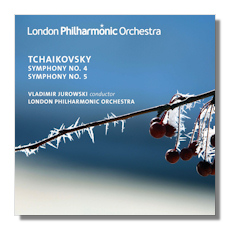
The Internet's Premier Classical Music Source
Related Links
- Tchaikovsky Reviews
- Latest Reviews
- More Reviews
-
By Composer
-
Collections
DVD & Blu-ray
Books
Concert Reviews
Articles/Interviews
Software
Audio
Search Amazon
Recommended Links
Site News
 CD Review
CD Review
Piotr Ilyitch Tchaikovsky

- Symphony #4 in F minor, Op. 36
- Symphony #5 in E minor, Op. 64
London Philharmonic Orchestra/Vladimir Jurowski
London Philharmonic LPO-0064 2CDs 85:36
Play a game with your friends who are well-versed in classical recordings. Play the first few minutes of either disc, and see which orchestra they guess is playing. I don't imagine anyone will guess the London Philharmonic Orchestra, which plays in a manner not unlike the great Russian ensembles of the past. Simply put, conductor Vladimir Jurowski has cultivated his orchestra into a remarkable Tchaikovsky ensemble, and should he finish the cycle, I might even care about the "Little Russian" and "Polish" Symphonies. Symphonies One and Six are also available on a two-disc set, and Jurowski's Manfred is nothing short of incomparable.
There is no secret or rocket science here. Thrilling, borderline crude brass fanfares lead into some of London's best string playing on disc in decades. Jurowski sees the first movement as one giant arc, building tension steadily and never losing sight of the musical construction. Unlike older performances from Eastern Europe and the U.S.S.R. – which willingly yanked tempos and structure – Jurowski stays grounded and always creates heat from his unerring sense of flow and his trust in his ensemble. It pays off handsomely, because we never once question the commitment or the sense of direction. Listen to the lower half of the orchestra; never a strong suit with this bunch, they are happily present and full of gusto. Throughout the work, there is an urgency and passion that often gets talked about when discussing the composer, but all too rarely do we find those qualities in performance.
Indeed, what conductors like Riccardo Muti and now Jurowski fully understand is effectively balancing the composers' Romantic fervor with his genuine musicianship. Tchaikovsky is not Ravel, in that you cannot simply make beautiful and sensual sounds and call it a day. Rather, it is essential that a conductor maintains the sometimes precarious musical form that the composer sets up, for the music to go places and do things. You can – as mentioned above – pull the music around a bit, but that requires absolute commitment and naturally sounds horrific when done wrong. Thus, it takes real effort to make this music flow. Each movement of this Fourth has a clear sense of purpose. Take the Scherzo, for example. It features fantastic wind and brass playing, but the most impressive thing is the nobility that Jurowski finds at moderate tempos. Under Eugene Ormandy, this same section turns heavy, with just as accomplished an ensemble. The difference? Jurowski plays tremendous attention to articulation and dynamics, allowing each hairpin pizzicato to bristle with nervous energy. And that Finale? Explosive, but also supremely musical. Don't get me wrong, Ormandy's Sony and RCA readings are both classics, but to hear this London Philharmonic in such stunning form is a real treat.
Even more than the Fourth, the Fifth Symphony demands that the conductor hone his skills of balance and musical form. This is – and let's be honest – a problematic work in terms of its transitions and tempo changes. Even great Tchaikovsky conductors have had a terrible time with it, the Finale in particular. Szell, that fearsome taskmaster, simply refused to stumble, and Jurowski has his own ideas. A swift introduction is gloriously and intensely played. The conductor keeps the heat on, and doesn't drastically change his tempo or approach between sections. So far, so good.
The English have every right to be proud of their horn playing, and a lovely second movement gives way to a flowing and elegant waltz. Only the Finale lacks something. Jurowski takes such care in making this tricky movement cogent and to clarify the tempo relationships between sections. In doing so, he plays the whole movement rather "straight", and the result is both architecturally rewarding and curiously lacking in fire. Mind you, there are some exciting moments, but even the closing pages – which Jurowski refuses to slow down for – could use a touch more contrast. Still, at the twofer price and with the London Philharmonic Orchestra at their best, this is a set to own.
Copyright © 2015, Brian Wigman





















